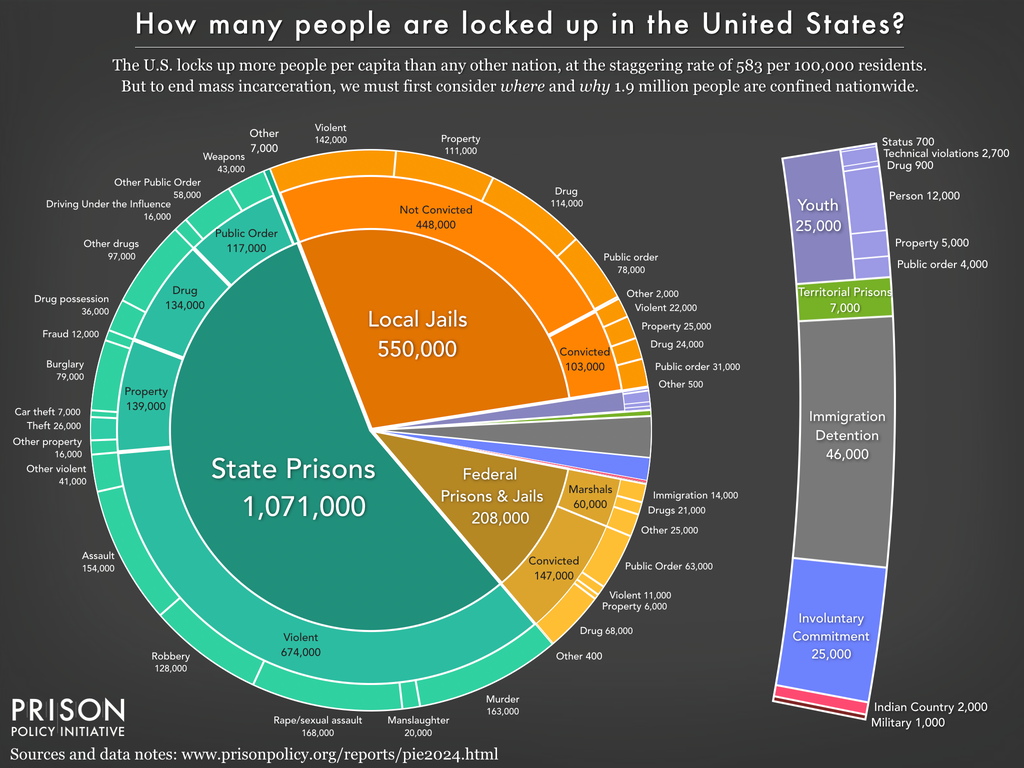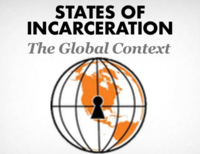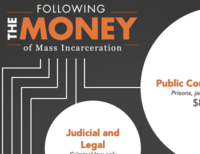Tenth-Anniversary Edition of The Whole Pie Report Provides the Big Picture of Mass Incarceration — and Busts 10 of the Most Persistent Myths about Prisons, Jails, and Crime
New report shows prison and jail populations rebounding after the pandemic and warns of the return of so-called “tough-on-crime” laws
March 14, 2024
Easthampton, Mass. — Ten years after publishing the first edition, today the Prison Policy Initiative released the 2024 version of its flagship report, Mass Incarceration: The Whole Pie. The report provides the most comprehensive picture of how many people are locked up in the U.S., in what types of facilities, and why. In addition to showing that more than 1.9 million people are behind bars on any given day in the U.S., it goes on to bust 10 of the most persistent myths about prisons, jails, crime, and more.

The report includes 34 visualizations of criminal legal system data, exposing long-standing truths about incarceration in the U.S., including:
- Many people in jail pretrial are stuck there simply because they’re too poor to pay their cash bail amount.
- Black people are overrepresented behind bars, making up about 42% of the prison and jail populations but only 14% of all U.S. residents.
- Technical violations — rather than new crimes — are the main reason people on probation or parole are re-incarcerated.
The report also shows that prison and jail populations have continued to rebound from their pre-pandemic lows, reversing a years-long decline in incarceration in the U.S. However, it explains that this growth is not due to increased crime but rather the criminal legal system returning to business as usual after pandemic-related slowdowns and the return of so-called “tough-on-crime” laws.
“The U.S. is at an inflection point in its failed experiment with mass incarceration. After years of progress reducing the number of people behind bars, many of the misguided policies that created this crisis in the first place are being resurrected,” said Peter Wagner, Executive Director of Prison Policy Initiative and co-author of the report. “The choices made by state, local, and federal officials over the next few years will determine whether the country repeats past mistakes or chooses a better path that makes communities safer and reduces the number of people incarcerated.”
Importantly, the report busts 10 of the most persistent myths about mass incarceration in America. In busting these myths, the report shows:
- Reforming the criminal legal system does not increase crime,
- Harsher punishments don’t deter crime, nor make communities safer,
- Jails and prisons are not equipped to provide mental health or substance use disorder treatment,
- And more.
“Too much of the conventional wisdom — and political rhetoric — about mass incarceration in America is just plain wrong,” said Wendy Sawyer, co-author of the report and research director for the organization. “While politicians and some in the media have found immense success ginning up fear about crime for their self-interests, this report gives the public the truth about what’s happening in the criminal legal system — and the tools to push back on bad faith arguments and lies.”
The original edition of Mass Incarceration: The Whole Pie, released in 2014, provided the first comprehensive view of the systems of criminal confinement in the United States. It helped to fill a critical gap in the movement to end mass incarceration. Since then, the annual report has become a foundational part of hundreds of advocacy campaigns, thousands of news investigations, and countless pieces of legislation that sought to expose the harms of mass incarceration and reduce the number of people behind bars. The organization has also produced versions of the report that look specifically at the incarceration of women and the incarceration of young people.
The full report is available at: https://www.prisonpolicy.org/reports/pie2024.html.



